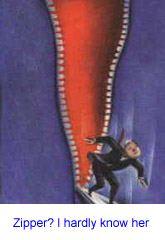|
|
Linda Chavez
The Press' Learning-disability
YOU'D THINK the press would have learned a lesson or two over the last five years in its dealings with Bill Clinton's White House, but apparently not.
Lesson one: Never believe any categorical denial of wrongdoing on first utterance,  since it's likely to be revised with clarifications, qualifications or obfuscations within
days if not hours. Lesson two: Never underestimate the White House response team's
ability to divert press attention away from the truth of the accusations and refocus it on
the motives of those doing the accusing.
since it's likely to be revised with clarifications, qualifications or obfuscations within
days if not hours. Lesson two: Never underestimate the White House response team's
ability to divert press attention away from the truth of the accusations and refocus it on
the motives of those doing the accusing.
Last week's contretemps over the subpoenaed testimony of presidential assistant Sidney Blumenthal once again demonstrates just how easily the White House can manipulate the media.
Last Sunday, White House spokesman Mike McCurry flatly denied that the White House had hired private investigators to look into the private lives of federal prosecutors, members of the press, or others involved in investigating or commenting on the most recent allegations of presidential misconduct. The denial came after stories surfaced that the White House was trying to intimidate critics by threatening to make public embarrassing information on their private lives.
"No one at the White House, or anyone acting on behalf of the White House, or any of President Clinton's private attorneys has hired or authorized any private investigators to look into the background of ... investigators, prosecutors or reporters," he said.
A day later, however, The Washington Post reported that the president's private lawyers had indeed hired Terry F. Lenzner, a former Watergate attorney who now operates a private eye firm, to investigate Independent Counsel Ken Starr's staff. This time, McCurry defended the action by saying the president's team was involved only in disseminating unflattering information about federal prosecutors that was a matter of public record.
"I think there's a difference between looking at what matters are on the public record, what's in the public domain, how people have used their positions of trust and authority -- whether they have misused those positions of trust and authority -- and personal derogatory information. I think there would be some distinctions there. I think it's a moot point because none of that type of work, to my knowledge and what's been conveyed to me by counsel, has been undertaken," McCurry said on Tuesday.
But by midweek, the press had all but forgotten the latest prevarications coming from the White House. Instead, the media were all in a tither about a former colleague, reporter-turned-White-House-aide Sidney Blumenthal. The focus was no longer on whether those in the White House had once again misled both the press and the American people and why, but instead on whether Blumenthal should be forced to reveal his conversations with reporters about Starr's staff.
Blumenthal proved himself a genius at pushing all the right hot buttons. "I never imagined that in America I would be hauled before a federal grand jury to answer questions about my conversations with members of the media," Blumenthal passionately intoned. He failed to mention precisely what dirt he'd been peddling to reporters about Starr and his staff, however, or what his motives were for doing so.
The strategy worked. Stories about prosecutorial overreach dominated reporting on TV that night and in the next several days' papers: "Counsel's Tactics Assailed," "Focus Shifts From Lewinsky To Starr's Aim," "Starr's Actions Found Wanting by Friend, Foe," "Is Investigating Lies a Waste of the Court's Time?"
A week that began with stories about the White House hiring gumshoes to track the president's critics ended with editorials questioning whether the critics themselves weren't the real problem. It's hard to imagine the scenario having played out this way during previous administrations. Envision how the press would have reacted during the Iran-Contra scandal if President Reagan's lawyers had hired private investigators to look into Lawrence Walsh's personal background or those of his staff. And what would the media's reaction have been if pundit-turned-presidential-aide Pat Buchanan had spent his White House hours calling up journalists to spread gossip about Walsh or his team?
Blumenthal defended his actions in peddling rumors and innuendo by invoking free
speech and freedom of the press -- proving that the First Amendment has become the
last refuge of liberal scoundrels. But the real threat to a free press is the way it allows
itself to be duped by such blatant
2/25/98: 50 States Are Enough!
2/18/98: Casey at the Mat
2/11/98: The legal profession's Final Solution
2/4/98: Faith and the movies
1/28/98: Clinton, Lewinsky, and Politics Vs. Principle
1/21/98: Movement on the Abortion Front
1/14/98: Clones, Courts, and Contradictions
1/7/98: Child custody or child endangerment?
12/31/97: Jerry Seinfeld, All-American
12/24/97: Affirmative alternatives: New initiatives for equal opportunity are out there
12/17/97: Opening a window of opportunity (a way out of bilingual education for California's Hispanic kids)